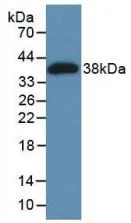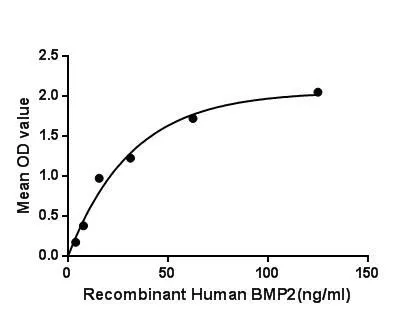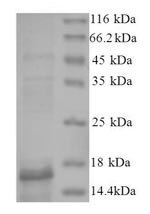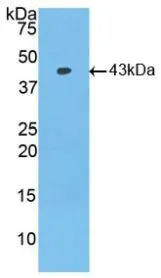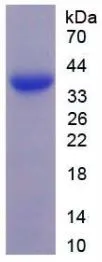
SDS-PAGE analysis of GTX00203-pro Human BMP2 protein.
Human BMP2 protein, His tag
GTX00203-PRO
ApplicationsFunctional Assay
Product group Proteins / Signaling Molecules
Protein IDP12643
Overview
- SupplierGeneTex
- Product NameHuman BMP2 protein, His tag
- Delivery Days Customer9
- Application Supplier NoteMicrofibrillar-associated protein 2 (MFAP2) is an O-glycosylated protein which excreted to the extracellular space and the extracellular matrix. MFAP2 combine biglycan and elastin to form a ternary complex. MFAP2 plays a key role in the support and distensibility of the juxtacanalicular region of these collector channels. It also can inhibit LTB-1 binding to fibrillin-1, stimulate the phosphorylation of Smad2, and thereby mediate the subsequent extracellular deposition of latent TGFbeta. Besides, Fibrillin 1 (FBN1) has been identified as an interactor of MFAP2, thus a binding ELISA assay was conducted to detect the interaction of recombinant human MFAP2 and recombinant human FBN1. Briefly, MFAP2 werediluted serially in PBS, with 0.01% BSA (pH 7.4). Duplicate samples of 100 microl were then transferred to FBN1-coated microtiter wells and incubated for 2h at 37C. Wells were washed with PBST and incubated for 1h with anti-MFAP2 pAb, then aspirated and washed 3 times. After incubation with HRP labelled secondary antibody, wells were aspirated and washed 3 times. With the addition of substrate solution, wells were incubated 15-25 minutes at 37C. Finally, add 50 microl stop solution to the wells and read at 450nm immediately. The binding activity of MFAP2 and FBN1 was in a dose dependent manner.
- ApplicationsFunctional Assay
- CertificationResearch Use Only
- ConjugateUnconjugated
- Gene ID650
- Target nameBMP2
- Target descriptionbone morphogenetic protein 2
- Target synonymsBDA2, BMP2A, SSFSC, SSFSC1, bone morphogenetic protein 2, bone morphogenetic protein 2A
- Protein IDP12643
- Protein NameBone morphogenetic protein 2
- Scientific DescriptionThis gene encodes a secreted ligand of the TGF-beta (transforming growth factor-beta) superfamily of proteins. Ligands of this family bind various TGF-beta receptors leading to recruitment and activation of SMAD family transcription factors that regulate gene expression. The encoded preproprotein is proteolytically processed to generate each subunit of the disulfide-linked homodimer, which plays a role in bone and cartilage development. Duplication of a regulatory region downstream of this gene causes a form of brachydactyly characterized by a malformed index finger and second toe in human patients. [provided by RefSeq, Jul 2016]
- Storage Instruction-20°C or -80°C,2°C to 8°C
- UNSPSC41116120
- SpeciesHuman

